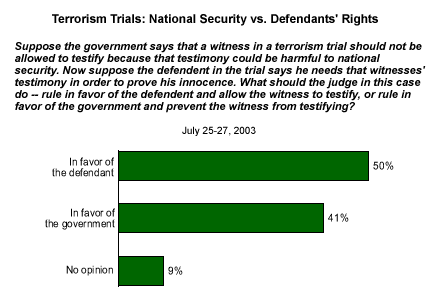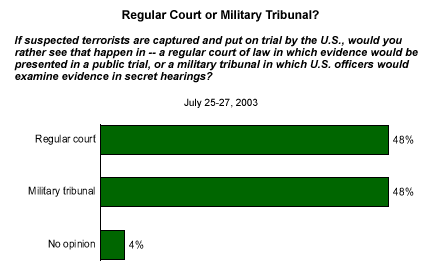Suppose the government says that a witness in the trial of a suspected terrorist should not be allowed to testify because the testimony could be harmful to national security. Now, suppose the defendant in the trial says he needs that witnesses' testimony in order to prove his innocence. Should the judge in this case rule in favor of the defendant or the government?
Gallup posed this hypothetical question to Americans in July*, a few weeks after the U.S. government announced it would defy a judge's order to allow suspected al-Qaeda conspirator Zacarias Moussaoui to interview another al-Qaeda operative in U.S. custody. The results indicate that half of Americans (50%) would concur with the judge's ruling (in favor of the defendant's position) in this case, but a substantial percentage of them (41%) would be sympathetic to the government's position.

Threats to national security and the Sixth Amendment right for a defendant to have "compulsory process for obtaining witnesses in his favor" are at odds when situations such as these play out in U.S. civilian court. In Moussaoui's case, the U.S. government maintains that allowing the captured al-Qaeda operative to testify would threaten national security. Moussaoui, sometimes referred to as the "20th hijacker" in the Sept. 11 terrorist attacks, maintains that the operative's testimony would clear him.
Ideology and Politics
People's partisan and ideological identities clearly color their opinions on what or who should be protected under such circumstances. Americans who have tended to show greater support for the "rights of the accused" were most likely to favor a ruling consistent with the defendant's position. Seventy percent of those who identify themselves as liberals said that the judge should allow the witness to testify, while only 25% disagree. Self-identified conservatives, for whom national security has traditionally been a key issue, hold different views, with 51% favoring the government's position and 39% favoring the defendant's. Similar results are evident according to Americans' partisanship, with Republicans more likely to favor the government's side and Democrats more likely to favor the defendant's side.
Are Military Tribunals the Answer?
When the U.S. government stated that it would defy the judge's order in the Moussaoui case, it also recognized that the judge could respond by dismissing the case altogether. If the case is ultimately thrown out (the judge has yet to issue a decision either way), the government may choose to try Moussaoui before a military tribunal, in which a defendant has fewer rights than in a civilian trial. The United States has not used military tribunals since World War II.
In the July poll, Gallup also asked Americans if they support trying suspected terrorists in a regular court of law with a public trial, as opposed to a military tribunal with secret hearings. Opinion splits evenly on this question, with 48% of Americans preferring to try terrorists in a regular court, and 48% preferring a military tribunal.

Differences in Americans' responses to this question are drawn along political and ideological lines as well. By nearly 2-to-1 margins, liberals and Democrats prefer the trials take place in a civilian court. In contrast, conservatives and Republicans favor those trials take place in a military tribunal, by similar 2-to-1 margins.
Bottom Line
If Moussaoui's case were to be moved to a tribunal, it would join a host of others that will likely be brought against "enemy combatants," including al-Qaeda and Taliban suspects currently being held at Guantanamo Bay in Cuba. So far, according to published reports, President Bush has named six of the prisoners as tribunal candidates. The Bush administration's stance on war tribunals is controversial abroad as well as at home, and with an ongoing war on terror, the case for rights versus national security in civilian trials and tribunals is not likely to rest soon.
*Results are based on telephone interviews with 1,006 national adults, aged 18 and older, conducted July 25-27, 2003. For results based on the total sample of national adults, one can say with 95% confidence that the margin of sampling error is ±3 percentage points.
